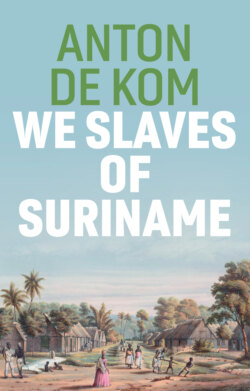Читать книгу We Slaves of Suriname - Anton de Kom - Страница 19
Solidarity
ОглавлениеDe Kom did not, however, hold all white people responsible for the suffering and exploitation of the Surinamese people. On the contrary, during his years in the Netherlands he was in communication with socialists, communists, and nationalists from various backgrounds, including some from what is now Indonesia. This made him aware of the intersection between racism and the economic system. In his book, De Kom addressed white Dutch workers directly:
We ask the Dutch workers: slavery has been abolished in Suriname, but can you call those who are forced to work under such a contract truly free? (p. 152)
De Kom saw white workers not as enemies or as competitors but as potential comrades in the struggle for all people to live in dignity. He must have learned from communist periodicals such as Links richten (“Aim Left”) about the international labor movements that were at their height in the 1930s.
In 1934, Anton met another Surinamese resistance fighter, Otto Huiswoud. Like De Kom, Huiswoud had been born after the abolition of slavery, and in the early twentieth century he had made his way to New York. In 1919, he became the only Black co-founder of the Communist Party of the United States of America. He and his wife Hermina Dumont-Huiswoud traveled the world in support of their ideal: a global revolution through class struggle.
What did De Kom and Otto Huiswoud talk about? The archives show that, along with the artist Nola Hatterman, they attended an Anti-Imperialist League conference in Paris together. The Huiswouds were the editors of the communist newspaper The Negro Worker; in the June 1934 edition, they published an English-language article by De Kom entitled “Starvation, hunger and misery in Dutch Guyana.” In that international forum, De Kom sharply criticized Suriname’s colonial system, writing:
We remember the 16 million florins, Holland gave the white slave barons as indemnity for the emancipated slaves. These millions were given to the Bakras (whites) as a reward for the inhuman deeds they committed against the Negro slaves our forefathers. But to the slaves and today to the free Negroes not a penny. Their only reward today is unemployment, misery and starvation.
Only through organization and struggle can the workers of Dutch Guiana succeed in bettering their living conditions and effectively fight against the exploitation and slavery imposed upon them by the Dutch colonial rulers.
Only through solidarity and joint struggle between the workers of the capitalist countries and the colonial toilers can an effective blow be dealt to the common enemy: Imperialism. Workers, organize and fight against exploitation, unemployment, and starvation! Close ranks in struggle for the emancipation of the colonial toilers!
Demand the independence of Dutch Guiana!
This relatively brief article was written in a style very similar to that of We Slaves of Suriname: clear examples of the exploitation of Surinamese workers, a comparison to exploitation in the days of slavery, and an appeal to workers to unite. The striking thing is that in this article he explicitly called for Surinamese independence. De Kom often wrote about “workers” and “proletarians.” His objective was to unite workers from diverse backgrounds:
And maybe I will find a way to make them feel some fraction of the hope and courage contained in that one powerful word I learned in a foreign country: organization. Maybe I can put an end to some of the dissension that has been the weakness of these colored people; maybe it will not prove completely impossible to make Negroes, Hindustanis, Javanese, and Indians understand that only solidarity can unite all the sons of Mother Sranan in their struggle to live with dignity. (p. 202)
This razor-sharp analysis and message of struggle, sometimes presented in a poetic, literary manner, and sometimes in a factual, historical way, is what still inspires generation after generation. De Kom’s insights into the decades-long impact of the legacy of slavery and the colonial system, both in Suriname and in the Netherlands, give the book its timeless relevance. When we talk about Black history, our thoughts often leap to the Black intellectuals and freedom fighters who left us their timeless work, to figures such as Martin Luther King Jr., Marcus Garvey, Angela Davis, Malcolm X, and Frantz Fanon. Anton de Kom’s words and deeds have earned him a place among them.
